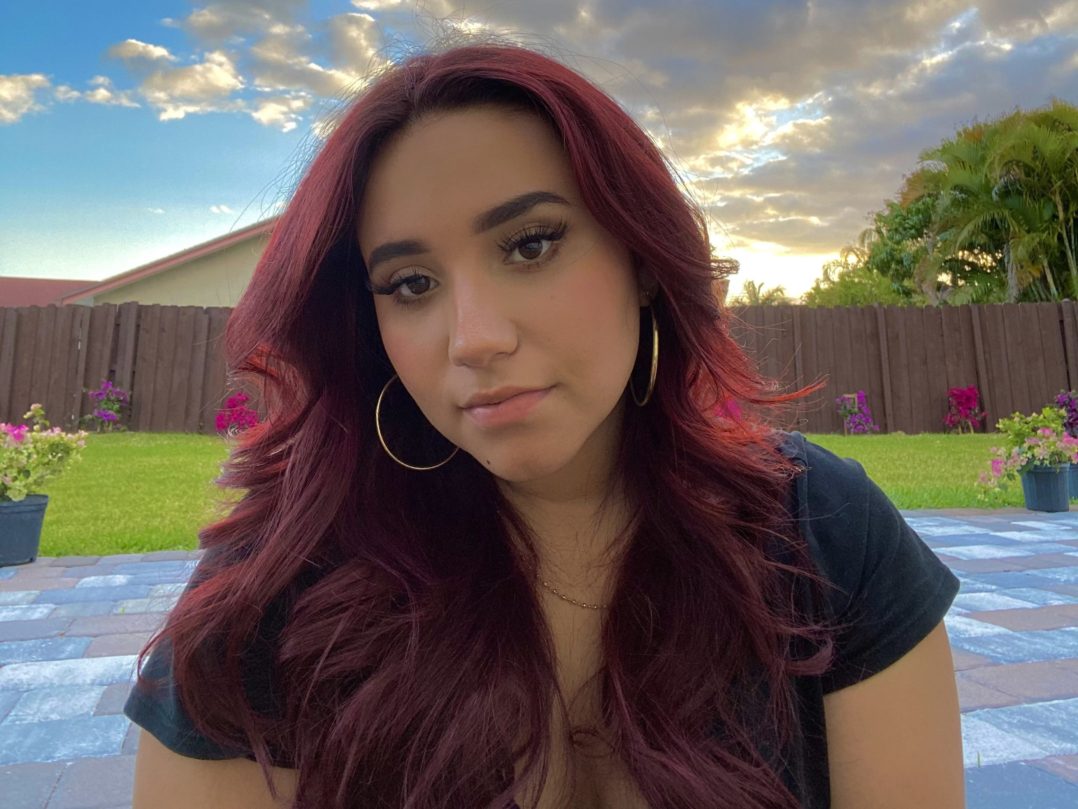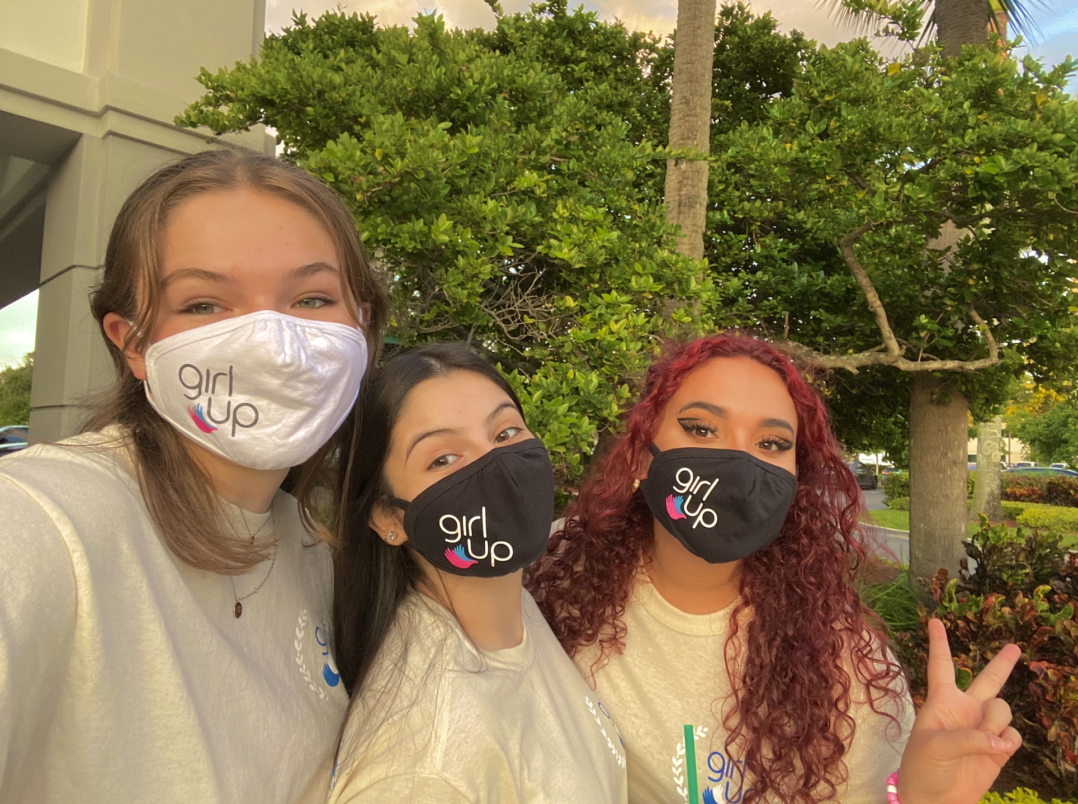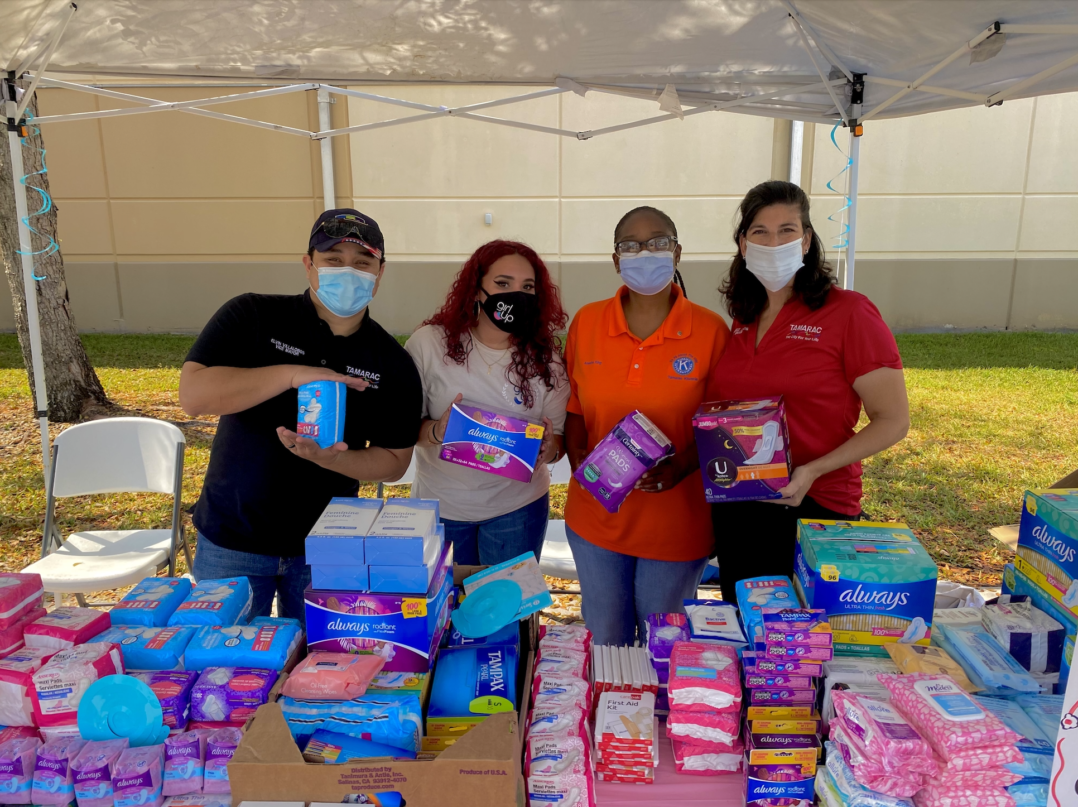COMMENTARY: A Florida High School Student Takes the Lead in Pushing for Menstrual Equity Policies
Guest blogger Alex Diana Hernandez is a senior at Coral Glades High School in Coral Springs, Florida, where they have become an outspoken activist for menstrual equity. Their work coincides with UnidosUS’s own support of the Learning with Dignity bill (SB242), which is aimed at ensuring all female bathrooms in Florida educational facilities are stocked with free menstrual products.
In 2018, I transferred to Coral Glades High School in Coral Springs and found myself looking for my place and my purpose. I would sit in my classes for women’s studies and civic engagement, wondering what impact I, an American student of Colombian, Cuban, and Puerto Rican descent, could have on the world. It turns out I didn’t have to look far.
Once a month, I noticed one of my classmates, a Venezuelan immigrant and English learner, asking permission to leave class in order to visit the nurse’s station. Confused and concerned by this pattern, one day I offered to accompany her. When we got there, I realized she was asking the nurse for menstrual pads, but instead of giving her a handful of these standard products, the nurse handed her a wad of folded-up toilet paper with some tape for a makeshift pad—just one—for a whole period!
Keep up with the latest from UnidosUS
Sign up for the weekly UnidosUS Action Network newsletter delivered every Thursday.
“How can this be?” I asked the nurse.
She told me that since menstrual products are part of reproductive health, they fall into the same category as contraceptives, and therefore cannot be given out in Florida public schools.
“But those are two different things with two different functions for two different situations,” I told her.
I then turned to my friend.
“Can’t you buy menstrual products?” I asked her.
She said she couldn’t. It had been five months since she’d emigrated to the United States and taken on the role of primary caretaker for her grandmother, all while studying and working a part-time job at McDonald’s. The money was tight, and her grandmother was undocumented, so there was no public assistance.

Given that my family members had emigrated from countries with similar social and economic struggles, I had heard of scenarios like these, but I thought of it as something that happens in another country, not in the United States, not in Florida, not in this public school. And yet it is happening, and undocumented girls like these are in need of everything from lunches to school supplies and yes, that too, personal hygiene products. Sure, my school had dispensers, but they were never filled, and even if they are, who can afford $1 in coins for every pad they need?
Shocked and horrified, I started buying her a monthly box of pads, and asked what else she could use. Pretty soon she was telling me that lots of other girls at school were struggling with the same circumstances but were too ashamed to voice it. She told me that every week, the girls would go to the nurse’s station and bring bad back wads of toilet papers to distribute among the menstruating students in need. Pretty soon I was using all my own money to get these supplies and asking other friends to donate to the cause. Within two months, I had dozens of girls asking me for pads. Word gets around fast when the need is great, even in a school of 2,000 students.
“Alex, are you bleeding every day?” My dad asked. “Why is it that you are buying so many products? As far as I know you only have one body.”
I explained to my family that there was a need in my school, and I was striving to address it.

It wasn’t long before my women’s studies teacher, Angela Andriesse, also got word, and she told me to join the chapter of the United Nations female empowerment program Girl Up. She said that we would make my small project into a big project with the club. With that we were able to turn this small, grassroots effort into an official school campaign, one tied to a much larger global movement. And as it did, I learned how much more education needed to be done within the walls of the school.
For instance, it isn’t enough to put menstrual products in the girls’ bathrooms. In fact, doing so is the least they can do. We have period poverty in America because historically, those in power don’t see a point in making policy changes for things that don’t affect them, either because they don’t have a menstrual cycle or they never had to worry about how where or how to obtain menstrual products.
To make matters worse, even in 2021, many societies, including that of the United States, treat periods as a taboo or even a shameful topic. Doing so leads to misinformation, and when educators don’t teach about them or make the hygiene products associated with them a normal part of school life, students who have them are left feeling isolated and along, often clueless about what this natural body function is and how to deal with it.
And sometimes you have to confront some pretty serious sexism. In one of my classes, a male teacher put the box in front of the classroom so that every student could see her trying to deal with her period. Once when I was dropping the products in his room, he even made groaning noises as though he were sexualizing the products, prompting me to report all of the above to school administrators. I also had to remind them that it’s more than half of the student body who are menstruating.
By my junior year, I was getting involved in a number of civic engagement clubs, and in them, I spent a lot of time telling other students—especially guys—why these products are so important. Some people might have thought I was making a fool of myself because people were afraid to talk about periods, but that’s the only way to get rid of the stigma of a perfectly normal bodily function. I would go classroom to classroom, dropping off the period boxes, and showing how to use them.
Now in my senior year at Coral Glades High School, I’m proud to say the school finally has an official budget to buy and stock every single classroom with these much-needed menstrual hygiene products. With my school’s UN Girl Up chapter, we have been able to host a period drive with the City of Tamarac, and civic groups including The Kiwanis organization, Key Clubs, Beauty Initiative, and Christmas in July to collect products for homeless youth in Broward County. In fact, on our first day of collection, we gathered almost 10,000 items. Christmas in July and Latinos in Action have also helped me send period products to cities in Colombia, Ecuador, and Indonesia.
The advocacy work that I have done with Girl Up has also received recognition from celebrities such as actress Isabella Gomez, who stars on the Netflix Original show One Day at a Time, from Dan Hernandez, screenwriter for the film Detective Pikachu, and Beachbody trainer Megan Davies.
And while it’s exciting to see how far I’ve been able to take my menstrual products mission, I know we need to push for bigger, better policies. Right now, in the state of Florida, legislators are considering the Learning with Dignity bill, which would ensure those same products are made available in girls’ bathrooms in any public school building.
I am just a student who banded together with other students to make a change. Ideally, I want to see those products in more than just the bathrooms, but I know this is an excellent step toward greater societal consciousness and inclusion. What I need most is for adults in power to start seeing this need and taking action on it so that every person in need of hygiene products has access to them.
More than half of people in school and in the workforce have ovaries, and a lot of them menstruate. We have a right to be there, we have an opportunity to contribute to our communities and our worlds, but we can only do so when we can fully participate, something we can only do with the proper hygiene products.

